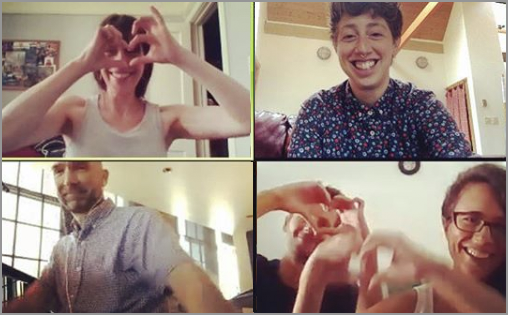A role model is exactly what it sounds like: someone who fits a role that you’d like to model. If you want to be an actor, your role model might be Dev Patel. If you want to be a media mogul, your role model might be Oprah.
The problem is, when you fit multiple roles, finding the perfect role model can be confounding. You may have a hard time picking a single person to model the role you’re creating for yourself. So how does a multipotentialite pick a role model? Before we answer that, I think it helps to understand the utility of a role model in the first place.
The purpose of a role model
Over in the Puttytribe, Maja recently wrote: “I see ‘role models’ more as mentors – someone to show you what is possible.”
Having a role model is like taking a gently worn path to get from Point A to Point B. It’s a shortcut to figuring out where you need to go. And yes, maybe you’ll travel even farther and forge your own paths, too, but it can help to build upon what someone else has already achieved. Entire civilizations are built on this concept — there’s no shame in applying it to your career or other endeavors.
When your career is a Frankensteinian hodgepodge of roles, however, you might have to get creative. But you’re a multipod, so you’re probably used to joining seemingly unrelated concepts. Creativity is kind of your thing.
Frankenstein your role model
One way to find your multipotentialite role model? Build it. Here’s a simple, but helpful exercise I tried recently: I make a list of people I admire — potential role models. Then, I write down exactly what I admire about them. As an example, here are a few of mine:
- Soledad O’Brien: I admire her journalism career and her entrepreneurship.
- Ariel Levy: I admire her reporting and her writing style.
- Anthony Bourdain: I admire his irreverence and perspective on travel.
- Issa Rae: I admire her sense of humor and intrepidness.
These are all wildly different people who’ve had wildly different careers. Yet they’ve all done something I’d like to do. When I sit down to write an essay, Ariel Levy is my role model. When I think about starting my own business, I think about Soledad O’Brien. You get the idea.
You could also start with your interests and build from there, instead. If you want to be an artist, whose artistic career do you respect? If you also want to start a business, who do you admire who has done this?
Take this exercise a step further and note what your role models are doing that doesn’t fit your own mold. Doing so will give you a clearer understanding of your own goals. Create an avatar out of your Frankensteined role models. Give them a name, a story. This makes it easier to write your own.
Find the intersections
In a recent Puttytribe discussion, Vikki brought up an interesting point:
“One of our multipotentialite superpowers is that there literally is no-one else out there with the same blend of experiences and interests, and therefore we bring unique perspectives to any aspect of life we get involved in! We see the intersections and gaps that others miss because they are ‘specialist’ or ‘niche’ or ‘silo’ed’.”
Look for these intersections and gaps in your own role model list. Is there anything that’s missing? And what are some traits or roles these models have in common? For example, Ariel Levy and Anthony Bourdain both glean many of their stories from travel — it seems that’s something I might want to explore.
Finally, I think it’s important to note that as your own path changes, your role models might change, too. As a multipod, you might find yourself doing this often. But really, isn’t that the best part about being someone who’s willing to explore their many interests and identities? You get to decide who you are and what your path will look like.
Finding role models who look like you
When I followed up with Maja about her original question in the Puttytribe, she wrote:
“As a 57 yr old gay female who would rather be outside doing extreme adventure, such as my new challenge of racing around the world in a sailboat next year, there is no one out there in the major markets that looks or even sounds like me. The people I do follow are all white guys… which is not me!”
If you can appreciate the unique challenge of finding a role model who fits your many interests, you can probably also appreciate the need to find role models who look like you.
If your ethnicity, gender, or age is underrepresented in a particular market, it’s easy to get discouraged – you might start to think that people who look like you can’t accomplish the same things as people in dominant demographics. It’s important for underrepresented groups to find role models whose backgrounds or life experiences are similar. You need evidence that even though you’re not in the dominant culture or group, your hopes and dreams are still achievable.
Earlier this year I interviewed Kevin Cokley, a professor of educational psychology and African diaspora studies at the University of Texas at Austin, for this New York Times piece on imposter syndrome among minority groups. He offered some advice I think is applicable here, too: Join or create an affinity network.
Dr. Cokley describes an affinity network as “a group of people who are similar to you, based on gender or ethnicity, and you can talk about your vulnerabilities and insecurities.” This way, you can get the encouragement you need from people who know what you’re going through. You can either use these colleagues as role models or get some ideas of role models they might know.
So where do you find these affinity groups? (They’re also known as employee resource groups or shared interest groups.) Some corporations offer them to employees, or you might be able to find some through Facebook, LinkedIn, or alumni networks through your college.
Better yet, start your own group. Try reaching out to colleagues, peers, and friends with similar experiences or backgrounds and plan a small meet-up at a local coffee shop or via Skype. Even if it’s one-on-one, having someone in your corner can go a long way.
Puttytribe member and Puttylike editor, Claire Nyles, said social media can be useful for countering this problem, too:
“I try to tailor my social media so that I’m following people who I look up to. I want to surround myself with more images and words of people who are encouraging. That’s sometimes just a matter of finding the right hashtags to search, and finding people’s profiles from there whose work I want to learn more about. It’s not necessarily a way to build deep, meaningful connections or find a mentor — but it can help counter the onslaught of just seeing one type of person doing Your Thing.”
Ultimately, Maja said her solution was to “become the person I would want to follow and build my own subtribe.” I think I like this idea best. While it’s helpful to have someone else’s footsteps to follow, we’re all different and sometimes that means forging our own path.
But if you can find people to join you along the way, even better! And on that note…
Need a little extra help finding multipod mentors & peers?

Did you know we have a private community of hundreds of multipotentialites from around the world? We support each other, share advice and cheer each other on as we building lives and careers around ALL our passions.
Learn more about the Puttytribe and get notified next time we open the doors:

Your Turn
What do you think, multipods? Do you have role models? And if so, how do you pick them? Share your thoughts in the comment below!

I love this post so much! I have a few role models and i’m sure in the future there’ll be more!
I admire Steve Irwin for his work with reptiles I have such a love for exotic animals I have plans to hopefully be a veterinarian or vet tech, since I was a young child I’ve always had a love for science and still do so Bill Nye has always been really fascinating to me! I’d love to be a doctor too or something science related! And to be honest, Emilee is someone I look up too also as a role model! The fact that I don’t have to choose and there’s endless options of careers as a multi pod!
Thank you, Kayla! Those are great role models. Emilie is one for me, too 🙂
I do have role models–and a couple of mentors, too. I’m lucky to have a couple friends who are around my age (60-ish) who are also creating new careers and trying some new things. But I do long for someone who could help me piece everything together.
I’d love a mentor who could help me figure out how to balance all my different interests–and earn money, too.
That might be a good idea for a whole other post – how to turn your role models into mentors ?
My first multipod role model to come to mind is Data, the android officer from Star Trek TNG (LOL). His quest to learn *everything* that happens to catch his interest is a wonderful example for me to follow.
His flaw as a role model of course is that he’s not human, but for that aspect, I can always fall back on Diego de la Vega (Zorro) as played by Duncan Regehr, who portrays him as a kinda second Leonardo da Vinci: an inventor and multidisciplinary scholar, who puts his extensive skills and knowledge to good use to fight for justice.
It’s the added fight for justice in him that appeals to yet another side of me. For this, I even have a contemporary role model in Domenico Lucano, the immigrant-friendly mayor in southern Italy who welcomes refugees to his little town in order to help revive it – and quite successfully, too.
But of course, these are all males… 😉
And Susan:
“I’d love a mentor who could help me figure out how to balance all my different interests–and earn money, too.”
I’ll second that!!
Hi thank you Kristin for posting such a inspiring article that has definitely lifted my spirits! As we all familiar with living in a specialist finding a role model who experience the same amount of curiosity to explore different ideas and interest can be quite difficult and taxing! Each time when you think you found a potential role model or multipod, you realize they are a specialist in sheeps clothing! Hence is why as a multipod i believe it’s important to find several different role models who embodies each of your interests.